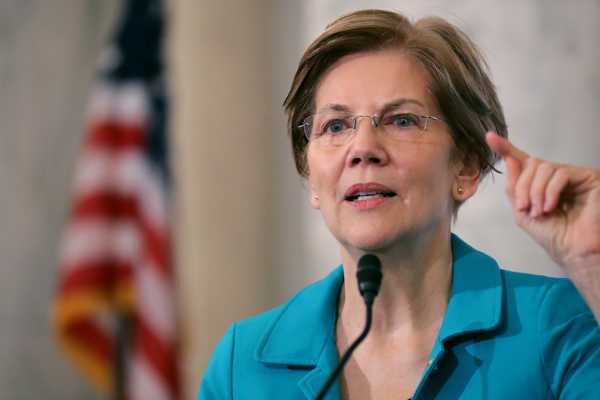
Sen. Elizabeth Warren (D-MA) isn’t ready to cede trade policy themes to President Donald Trump.
In a speech set to be delivered Thursday afternoon at American University, in Washington, DC, Warren unloads a biting critique of a generation’s worth of neoliberal trade policy consensus in Washington and — strikingly — insists that despite Trump’s embrace of protectionist rhetoric and aspects of protectionist policy, he hasn’t gone nearly far enough.
Trump’s tilt against open trade and overt embrace of protectionist rhetoric and policy has led to widespread speculation that the parties might realign on trade, with Democrats becoming a free-trade party and Republicans becoming protectionists.
Indeed, that’s how the parties had aligned themselves at one point so a Trump-induced flip-flop would arguably have just reset things after the Reagan-to-Obama era. Warren, however, isn’t having it.
In a draft of her speech, which touches on a range of foreign policy and national security themes, Warren says that “beginning in the 1980s, Washington’s focus shifted from policies that benefit everyone to policies that benefit a handful of elites, both here at home and around the world” with international economic policy very much front-and-center in that switch. And she argues that Trump has been much more a continuation of that bipartisan consensus than a break with it.
The Warren Doctrine on trade: America first
Of course, the left-wing critique of US trade policy is nothing new and has always been somewhat different in its content than Trump’s brand of criticism.
An interesting aspect of Warren’s take on trade is that in one crucial respect she breaks with the left, saying “the globalization of trade has opened up opportunity and lifted billions out of poverty around the world.”
That’s the kind of thing that you normally hear from centrist defenders of the bipartisan trade consensus (here’s Vox’s own Zack Beauchamp saying it), but Warren isn’t bringing up globalization’s role in fighting global poverty to praise globalization. Instead, she describes a scenario in which Western elites teamed up with the global poor to soak the American middle class:
This is roughly the story told by economist Branko Milanovic’s “elephant graph” (a portrait of the world economy that is not universally accepted), which shows a vast increase in prosperity for the global elite paired with a significant reduction in global poverty, but a stagnation in incomes for middle-class residents of developed countries.
Left-wing critics of globalization typically deny that this tradeoff exists, portraying instead what economist Jeff Faux terms a “global class war” in which the poor and middle class all around the world are losers. Warren — more like Trump — embraces the tradeoff and simply says that politicians should put Americans’ interests ahead of foreigners. Except she denies that Trump has actually done this.
Warren wants to outflank Trump on trade
“The president grabs headlines railing against GM’s plans to axe thousands of American jobs in Ohio and Michigan,” Warren says in the speech, in a fairly obvious attack on Trump, “but his actual policies aren’t stopping them or others like them from continuing to put corporate profits ahead of American workers.”
More strikingly, though, Warren specifically argues that Trump’s signature renegotiation of NAFTA is a sellout of NAFTA critics.
“There’s no question we need to renegotiate NAFTA,” she says, before rehashing some of the standard anti-NAFTA talking points that trade skeptics have circulated for years. “But as it’s currently written, Trump’s deal won’t stop the serious and ongoing harm NAFTA causes for American workers — it won’t stop outsourcing, it won’t raise wages, and it won’t create jobs. It’s NAFTA 2.0.”
Warren says the tougher labor standards in the new deal are toothless, the environmental standards are lacking, and it’s “stuffed with handouts that will let big drug companies lock in the high prices they charge for many drugs.”
Consequently, she vows to oppose the deal in the Senate. She’s trying to set up a potential contrast not just with Trump but with other Democratic Party senators on truly supporting American workers who feel victimized by foreign trade.
An argument with implications for 2020 and beyond
Trade policy is an area that Warren has engaged with extensively in the past.
But the speech also delves into nuclear weapons, the war in Afghanistan, defense contracting, the military budget, and a range of other subjects in American foreign policy. In part that simply reflects the fact that Warren now serves on the Senate Armed Services Committee. That, however, also reflects the fact that former Democratic Senate leader Harry Reid got her a spot on the Armed Services Committee and told her to run for president during his final months in office after Trump won in 2016.
The larger speech, in other words, is about establishing Warren’s chops as a potential commander-in-chief.
That means the trade policy stuff should be seen in a 2020 context as well.
Warren is throwing down the gauntlet that to her an anti-Trump stance shouldn’t mean a knee-jerk embrace of everything that Trump criticizes. Both Bill Clinton and Barack Obama governed as part of the bipartisan consensus on trade policy, but most Democrats in Congress — and certainly Warren herself — did not.
Trump’s ascension has seemed in many ways to portend a more wholehearted Democratic shift in favor of the Clinton/Obama position.
Warren has planted a firm flag in the other camp, arguing that the right way to fight Trump on trade is to cast him as a faker. At the same time, she’s daring other Democrats potentially running against her to take the more straightforward “if Trump is bad, then globalization must be good” line.
Sourse: vox.com






